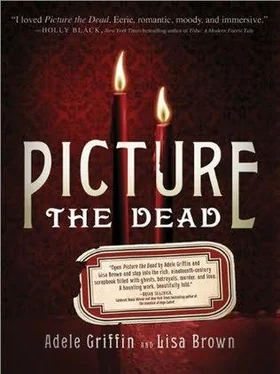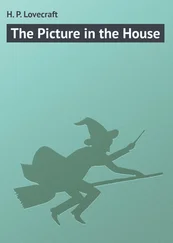Adele Griffin, Lisa Brown
Picture the Dead




A ghost will find his way home.
It’s dark outside, an elsewhere hour between midnight and dawn. I lie awake, frozen, waiting for a sound not yet audible. My eyes are open before I hear the wheels of the carriage at the bottom of the drive.
And now the dog is barking, and there’s faint light through my window. The hired man has emerged from his room above the stable, lantern swinging from his hand. I hear Uncle Henry’s lumbering tread, Aunt Clara’s petulant “Henry? Who is it, Henry, at this hour?”
I know that the servants are awake, too, though I can’t hear them. They have been trained to move in silence.
What if the carriage brings news of Quinn and William? Or even my cousins themselves? That would be too much luck, perhaps, but I’m not sure that I’m strong enough for less. Another loss would be unendurable. And we are never given more than we can bear, are we?
When I sit up, I am pinpricked in fear.
The corridor is freezing cold, and the banister is spiky, garlanded in fresh pine. With both sons at war and her only nephew buried this year, Aunt Clara nonetheless insisted on bedecking Pritchett House for the Christmas holiday. Uncle Henry always defers to his wife’s fancies. She’s a spoiled child, blown up into a monster.
Downstairs the front doors are flung open. I join the household gathered on the porch all of us but the hired man, who stands below in the drive as the trap pulls up. The moment feels eternal. I twist at my ring, a diamond set between two red garnets, more costly than the sum of everything I own. When Will slid it onto my finger, he’d promised that I’d get accustomed to it. Not true, not yet.
“Doctor Perkins,” says Mavis, raising the lantern as the doctor jumps down from the buckboard. The housemaid’s chattering lips are as blue as her bare feet, and her braid swings so close I could reach out and yank it like a bell cord if she didn’t scare so easy.
The doctor signals for Uncle Henry to help him with another passenger.
Quinn . The name shatters through me.
Aunt Clara looks sharp in my direction. Had I spoken out loud? I must have. But I’m sure it’s Quinn. And as the figure emerges, I see that I’m right.
Quinn. Not Will.
He is grotesquely thin and hollowed out, his left eye wrapped in a belt of cloth that winds around his head. He is barely human.
“I’ll need hot water and clean bandaging.” Doctor Perkins is speaking as Mavis’s lantern pitches, throwing wild shadows. “A step at a time, Henry.”
On the sight of her favorite son, Aunt Clara whimpers. Her hands clasp together under a chin that wobbles like aspic. “Oh, my darling boy, safe at home at last.”
Quinn ignores her, an old and useful habit. He brushes past Aunt, the plank of one long arm hooked over Uncle Henry’s neck. But then he squares me in his eye, and in one look I know the worst.
Will is not coming back.
Blood rushes to my head; I might faint. I lean back against a pillar and take slow sips of air.
“A few more steps,” pants the doctor. “Where is the closest bed?”
Quinn’s bedroom is all the way up on the third floor, an inconvenient sickroom. He’d moved there last year, before he’d found a richer rebellion in joining the army and leaving home altogether.
“Give him Jennie’s room,” says Aunt Clara. “Go on. It’s only one flight, off the landing. And Jennie can sleep up in Quinn’s room. It will work perfectly.”
These suggestions part so quick from her lips that I know they’ve been squirreled in her head for a while. Even through her dread and worry, my aunt has been plotting against me.
A very bad sign.

Mavis has darted ahead. Before the others have a chance to tromp their boots through my bedroom, she has rushed in and collected my treasures. Father’s pocket watch, my brother’s and my christening cups, the lace collar I have been straining my eyes and fingers over these empty evenings. But most important is my scrapbook. I shudder to think of Aunt Clara’s fat fingers picking through its pages. Perched on top of my possessions, in an offering of solidarity, is a photograph of Mavis, plain as a platter in her Sunday best. I will add it to my book when I have more than a moment to myself.
The room is tiny and airless and fitted with a narrow bed, an iron nightstand, and one dreary dormer window. Quinn had called it his rookery, and he’d relished its perch high above the family. I don’t feel the same way.
I exchange my candle for Toby’s little silver cup, and I wedge myself into the windowsill, bumping my head on the eave. My temples pound, my lips are dry, my mouth tastes of ash. I stare out at the tar black sky.
“Toby,” I whisper. “Is he with you?”
In answer, silence. But I know I’m not alone. A ghost will find his way home. I learned this nine months ago when my brother died in a field hospital in Stevensburg, Virginia. I was in the parlor that day, using the last light to cut linen strips for the Boston Ladies’ Aid. Toby’s presence was a wave crashing over me, knocking the breath from my body. Three days later we received the letter.
Many people have asked me if it’s strange to be a twin. I’d say it is far more peculiar to be a single twin. I was Toby’s alter and his double, and we created shelters for each other in the physical world. In life he’d been shy, and his death before he’d seen a day of combat was a quiet end to an innocent young life.
And yet in death Toby isn’t ready to go, or to let me go. We used to predict our futures on scraps of paper in the downstairs coat cupboard. When I stare into the eyes of his photograph, which is safely tucked inside my scrapbook, I can hear his whisper in my head, confiding his dreams to spy for the Union and regaling me with stories of Nathan Hale and how wars are won through ciphers and invisible ink. “A spy sees everyone, but is seen by no one,” he loved to say. “Remember that, Jennie.”
Other times, like now, he keeps silent, but I sense him. He guards me in spirit just he as did in the physical world. He has brought me closer to the other side, and I know that I’m changed.
“Please, a tiny sign,” I whisper, my hands clasping the cup like a chalice, “if Will is really dead and gone.”
“Who’s there?” Mavis has rushed into the room with armloads of my clothing. Her gaze jumps around the darkest corners of the room.
“Nobody. I was…praying,” I fib, hiding the cup from sight, and then we’re both self-conscious. Mavis makes a business of hanging my dresses in the single cupboard and folding some of my personal items into its top drawer. As I pace the room, worrying the frayed sleeve of my dressing gown between my fingers, I catch sight of myself in the window’s dark reflection. My hair springs wild from my head, and there is a stunned look in my eyes, as if I am not quite available to receive the news that I’m dreading to hear.
Читать дальше

















